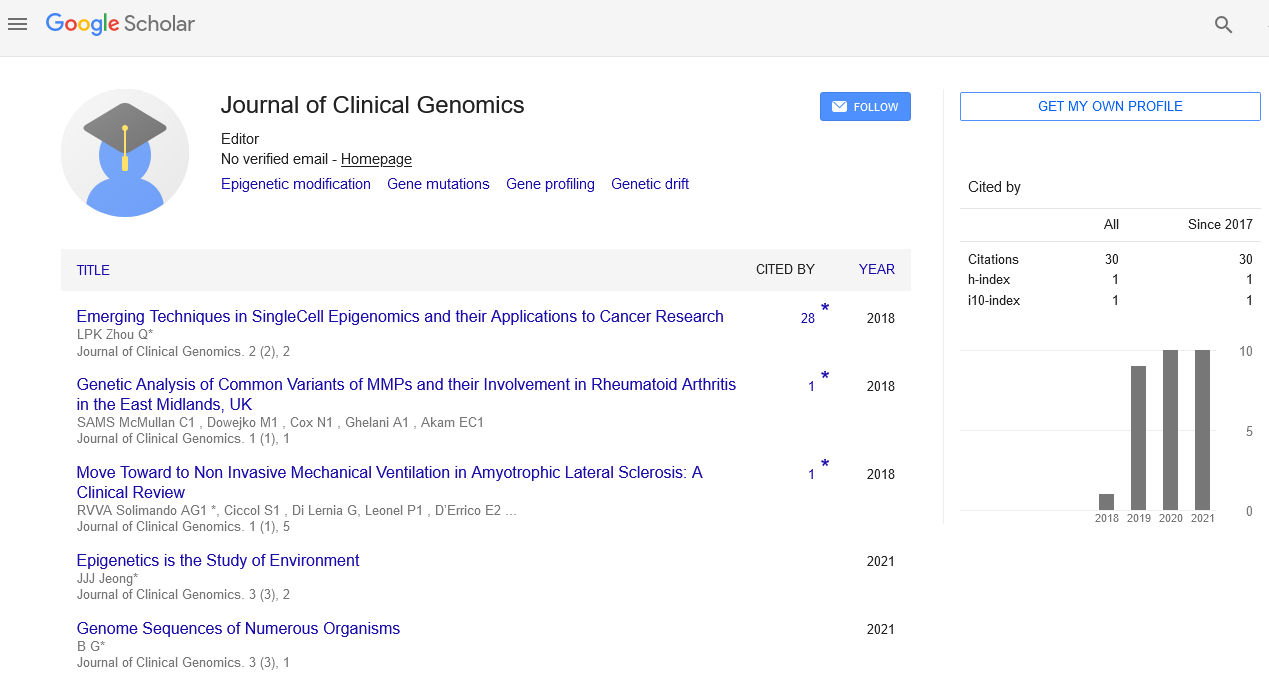Perspective, J Clin Genom Vol: 5 Issue: 3
Pharmacogenomics: Individualizing Drug Therapy Based on Genomes
Sofia Jolian*
1Department of Medical Microbiology, Leiden University Medical Center, Leiden, Netherlands
*Corresponding Author: Sofia Jolian,
Department of Medical Microbiology, Leiden
University Medical Center, Leiden, Netherlands
E-mail: joliansofia08@gmail.com
Received date: 02 September, 2023, Manuscript No. JCG-23-116284;
Editor assigned date: 04 September, 2023, PreQC No. JCG-23-116284 (PQ);
Reviewed date: 18 September, 2023, QC No. JCG-23-116284;
Revised date: 25 September, 2023, Manuscript No. JCG-23-116284(R);
Published date: 05 October, 2023, DOI: 10.4172/JCG.1000138.
Citation: Jolian S (2023) Pharmacogenomics: Individualizing Drug Therapy Based on Genomes. J Clin Genom 5:3.
Description
Pharmacogenomics is transforming the field of medicine by tailoring drug therapies to an individual's genetic makeup. Pharmacogenomics, a branch of genomics, focuses on the relationship between an individual's genetic makeup and their response to drugs. It has emerged as a revolutionary approach to healthcare, enabling the customization of drug therapies to optimize efficacy and minimize adverse effects.
Science of pharmacogenomics
Pharmacogenomics hinges on the understanding that genetic variations can influence drug responses. Key genetic factors include:
Drug metabolism enzymes: Genetic variations in enzymes like Cytochrome P450 (CYP) can affect drug metabolism, altering the rate at which drugs are broken down in the body.
Drug transporters: Genetic variants in drug transporters influence the movement of drugs across cell membranes, impacting drug distribution and efficacy.
Drug targets: Variations in drug target genes can determine a drug's effectiveness in modulating specific biological pathways.
Clinical applications of pharmacogenomics
Pharmacogenomics has already begun to influence clinical practice in several ways:
Tailored drug selection: By analyzing a patient's genetic profile, clinicians can choose medications that are more likely to be effective and safe.
Dosage optimization: Genetic information can guide the adjustment of drug dosages to ensure therapeutic levels are achieved.
Minimizing adverse effects: Identifying genetic variants that predispose individuals to adverse drug reactions allows for proactive measures to minimize risks.
Pharmacogenomics in action: Case studies
Warfarin dosing: The anticoagulant warfarin is notoriously challenging to dose due to variations in metabolism. Pharmacogenomic testing can help determine the optimal starting dose, reducing the risk of bleeding or inadequate anticoagulation.
Trastuzumab in breast cancer: In breast cancer treatment, the HER2 gene's status determines the efficacy of the targeted therapy trastuzumab. Genomic testing helps identify patients who will benefit most from this treatment.
Challenges and limitations
Despite its promise, pharmacogenomics faces certain challenges:
Data interpretation complexity: Interpreting genetic data in a clinical context can be complex, requiring specialized knowledge and tools.
Genetic diversity: Genetic responses to drugs can vary among different populations, necessitating a diverse and inclusive approach to research and testing.
Cost and accessibility: Genetic testing can be costly, potentially limiting access to pharmacogenomic insights for some patients.
Regulatory and reimbursement hurdles: Clear guidelines and reimbursement policies are needed to ensure the widespread adoption of pharmacogenomic testing.
Future prospects
Pharmacogenomics holds significant promise for the future of medicine:
Enhanced drug discovery: Pharmacogenomics can inform drug discovery by identifying potential drug targets and predicting responses in different populations.
Precision oncology: The field of oncology stands to benefit greatly from pharmacogenomics, allowing for highly tailored cancer therapies based on individual genetic profiles.
Pediatric medicine: Applying pharmacogenomics in pediatrics can optimize drug treatments for children, who often have limited drug options.
Integration with Electronic Health Records (EHRs): Integrating pharmacogenomic data into EHRs can streamline clinical decisionmaking, making it easier for clinicians to access and interpret genetic information.
Conclusion
Pharmacogenomics is ushering in an era of personalized medicine where drug therapies are precisely tailored to an individual's genetic makeup. Its current applications are already improving patient outcomes and safety. As the field continues to advance, addressing challenges related to data interpretation, diversity, accessibility, and regulation will be essential.
 Spanish
Spanish  Chinese
Chinese  Russian
Russian  German
German  French
French  Japanese
Japanese  Portuguese
Portuguese  Hindi
Hindi 